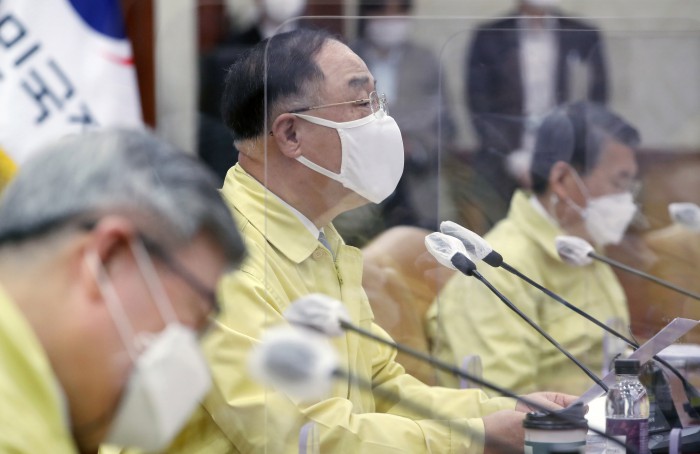[세종=뉴스핌] Reporter Choi On-jung = The government has decided to import 1.28 million tons
On the morning of the 7th, the government held the ’33rd Emergency Economy Central Countermeasure Headquarters Meeting’ presided by Deputy Prime Minister Hong Nam-ki and Minister of Strategy and Finance at the Government Complex in Seoul on the morning of the 7th, and decided measures to ease the burden of international grain import prices.
 |
| [서울=뉴스핌] Reporter Hak-seon Kim = Deputy Prime Minister Hong Nam-ki and Minister of Strategy and Finance speak at the Emergency Economy Central Countermeasure Headquarters Meeting and the Korean New Deal Ministers’ Meeting held at the Seoul Government Complex in Jongno-gu, Seoul on the 7th. 2021.04.07 [email protected] |
First, the government decided to apply an emergency quota tariff of 0% on edible corn, which has a basic tariff rate of 3% by the end of the year. Accordingly, tariffs of 12.8 billion won, which are imposed on the required volume of 1.28 million tons, will be reduced. Edible corn is widely used in Korea as a raw material for starch and starch sugar used in confectionery, bakery, beverages, starch syrup, and liquor.
The government also decided to cut the interest rate for the purchase of raw materials in the feed, food, and restaurant industries by 0.5%p to relieve the industry’s cost burden from rising international grain prices. The interest rate for the comprehensive food service fund and the raw material purchase fund for feed companies will decrease from 2.5 to 3.0% to 2.0 to 2.5%, respectively.
In addition, the government has been sharing the supply and demand situation by examining domestic and overseas grain market trends with related organizations and associations since April last year, centered on the Ministry of Agriculture and Food. On the 6th, the’International Grain Advisory Committee’ was held to check the current status of international grains. The committee is made up of experts from the government (Ministry of Agriculture and Food, Ministry of Equipment) and related industries, associations, and public institutions.
An official from the Ministry of Agriculture and Food said, “From the 7th, we plan to upgrade and operate the International Grain Advisory Committee, which has been operated so far, to the’International Grain Supply and Demand Countermeasure Committee,’ to more closely monitor international grain trends and to closely discuss with the industry.
